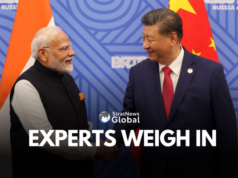Four years have passed since the deadly clash at Galwan. Yet, the standoff between India and China persists along the Line of Actual Control (LAC) in Eastern Ladakh. There have been several rounds of talks at both the military and diplomatic levels. But, some prickly issues remain.
At the moment, the India-China relationship is in a state of suspension, says former Foreign Secretary Vijay Gokhale. “There have been no serious efforts by either side to rebuild a political and diplomatic relationship, which collapsed after the Galwan incident,” he told StratNews Global.
Galwan, The Last Straw
Arrangements between India and China that were put in place between 1988 and 2010 are no longer tenable. In a number of cases, it is China that upset that relationship. Not just along the LAC but in other areas, such as India’s entry into the Nuclear Suppliers Group and listing of terrorists by the UN. By 2019, the relationship was already fraying and Galwan was the straw that broke the camel’s back, says Gokhale.
We have not taken steps to rebuild the relationship politically, economically, diplomatically or in any other area, he adds. “Since elections are now over, maybe it’s time and the opportunity for us to start thinking about how to build a new relationship.”
Need Fresh Start
It has to be a fresh start, asserts Gokhale. Because the actions of China have brought the boundary question again to the front and centre of the relationship. It’s not India’s condition that you must resolve the boundary issue in order to have a normal relationship. But the government’s position is right that the situation of the boundary is not something that both sides can accept and move on, says Gokhale who has also been India’s envoy to China.
What Next?
Contacts at the military level have continued but resumption of the political relationship needs to happen, feels Gokhale. It need not be at the summit level or even at the ministerial level to begin with. We can begin with official-level contacts with the express purpose of trying to build a new relationship and to start or restart the political dialogue. It can be at the level of joint secretary or even at the level of ambassadors, says Gokhale. But substantive discussions can happen either at the level of Foreign Secretary, Foreign Minister or the NSA.
Talks Don’t Mean Compromise
Talking to the Chinese does not in any way mean that you compromise either on your principles or on your asks. Nor does it mean that you scale down or diminish in any way your efforts and deterrence. Talking and deterring is a normal tactic of diplomacy used by many countries, says Gokhale.
Deleverage, Not Decouple
Against a gaping trade deficit with China, what should India do? One section advocates shunning imports. In a globalised world, dependence on external supply chains is part of the game. I think the government’s focus, and rightly so, is to deleverage, says Gokhale. In other words, try and reduce dependency on China as far as possible. And reduce dependency drastically in strategic sectors.
Nitin A. Gokhale is a media entrepreneur, one of South Asia's leading strategic affairs analyst and author of over a dozen books so far on military history, insurgencies and wars.
Starting his career in journalism in 1983, he has since led teams of journalists across media platforms.
A specialist in conflict coverage, Gokhale has covered the insurgencies in India’s North-East, the 1999 Kargil conflict and Sri Lanka’s Eelam War IV between 2006-2009.
Gokhale now travels across the globe to speak at seminars and conferences, and lecture at India’s premier defence colleges. He has founded three niche portals, Bharatshakti.in, stratnewsglobal.com and Interstellar.news.




